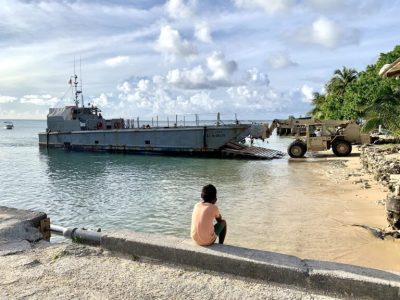America’s Military Empire. Why Does the U.S. Need a Network of Military Bases?

All Global Research articles can be read in 51 languages by activating the Translate Website button below the author’s name (only available in desktop version).
To receive Global Research’s Daily Newsletter (selected articles), click here.
Click the share button above to email/forward this article to your friends and colleagues. Follow us on Instagram and Twitter and subscribe to our Telegram Channel. Feel free to repost and share widely Global Research articles.
New Year Donation Drive: Global Research Is Committed to the “Unspoken Truth”
***
CNN is reporting that “gigantic” waves “swamped a key military facility in the middle of the Pacific Ocean last weekend.” The rush of water, which can be seen here, occurred on Roi-Namur Island, which is part of Kawajalein Atoll, “which hosts a US military ballistic defense test site in the Republic of the Marshall Islands.”
But that big wave raises an important question? Why does the U.S. government need an empire of foreign military bases? Unfortunately, hardly anyone asks that question. A vast worldwide empire of foreign military bases has become an accepted and integral part of American life. We’ve all grown up under this empire and so it’s just considered to be normal.
But it’s anything but normal, at least not compared to our nation’s original founding governmental system, which eschewed large, permanent military establishments and rejected, fully and completely, the concept of a worldwide military empire.
According to this article by David Vine, associate professor of sociology at American University and author of Base Nation: How U.S. Military Bases Abroad Harm America and the World, as of 2015 the United States maintained “nearly 800 military bases in more than 70 countries and territories abroad.”
I have read Vine’s book and I highly recommend it. I also recommend four books by Chalmers Johnson, who was a professor emeritus at the University of California, San Diego, and a former consultant to the CIA: Blowback: The Costs and Consequences of American Empire; The Sorrows of Empire: Militarism, Secrecy, and the End of the Republic; Nemesis: The Last Days of the American Republic; and Dismantling the Empire: America’s Last Best Hope.
Martin Luther King correctly pointed out that the U.S. government is the greatest purveyor of violence in the world. Its empire of foreign military bases plays an important role in the death and destruction wreaked by America’s federal killing machine.
But there is also the domestic empire of military bases to consider. It too has become a normal and accepted part of the American life. No one asks the important questions: What are all those bases good for? What purpose do they serve? Why can’t they be closed and sold off?
I can understand why the U.S. government would establish military forts during the 19th century. They were used to protect towns and settlements from attacks by Native Americans.
But today, no one is in danger of attacks from Native Americans. Moreover, there is no possibility whatsoever of a foreign invasion of the United States. No nation-state has the money, resources, manpower, military force, supply lines, or even interest in crossing either the Pacific or Atlantic Oceans to invade America. There is also no possibility of an invasion by Canada or Latin America.
Terrorism? Those domestic military bases do nothing to prevent terrorist attacks, nor should we want them involved in domestic criminal offenses. Moreover, once the federal killing machine overseas is shut down, the threat of anti-American terrorism disappears.
So, I repeat: Why do we need all those domestic military bases? Think of the tax money we could save by closing them and selling them off.
Indeed, think of the tax money we could save by closing and dismantling not only America’s foreign and domestic empire of military bases but also the national-security state itself. The conversion of the federal government to a national-security state has proven to be a disaster for the American people. Given that the Cold War, which was the justification for the conversion, ended long ago, why can’t we have our founding system of limited government republic back, along with just a relatively small military force?
These are the types of questions that the American people need to be asking if we are to get our nation back on the right track — toward freedom, peace, prosperity, and harmony.
*
Note to readers: Please click the share button above. Follow us on Instagram and Twitter and subscribe to our Telegram Channel. Feel free to repost and share widely Global Research articles.
Jacob G. Hornberger is founder and president of The Future of Freedom Foundation. He was born and raised in Laredo, Texas, and received his B.A. in economics from Virginia Military Institute and his law degree from the University of Texas. He was a trial attorney for twelve years in Texas. He also was an adjunct professor at the University of Dallas, where he taught law and economics. In 1987, Mr. Hornberger left the practice of law to become director of programs at the Foundation for Economic Education. He has advanced freedom and free markets on talk-radio stations all across the country as well as on Fox News’ Neil Cavuto and Greta van Susteren shows and he appeared as a regular commentator on Judge Andrew Napolitano’s show Freedom Watch. View these interviews at LewRockwell.com and from Full Context. Send him email.
Featured image: A U.S. Navy vessel in the Marshall Islands.

